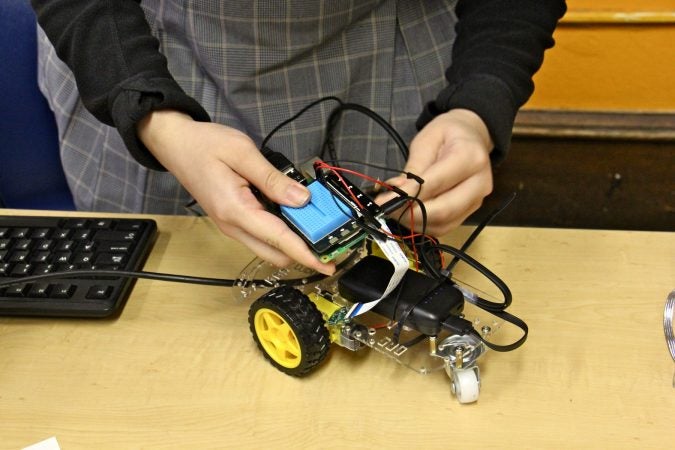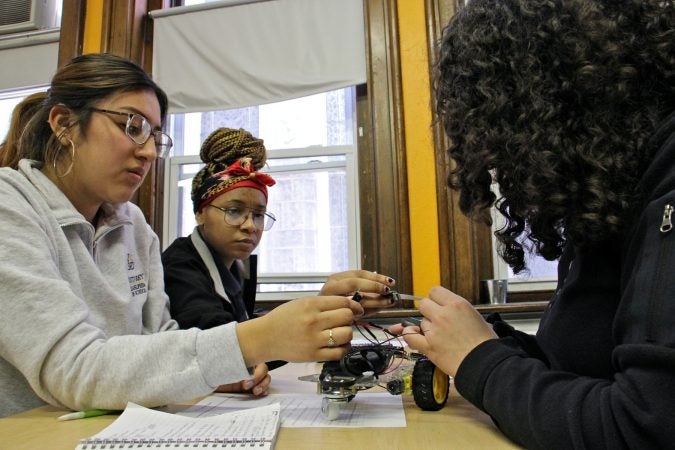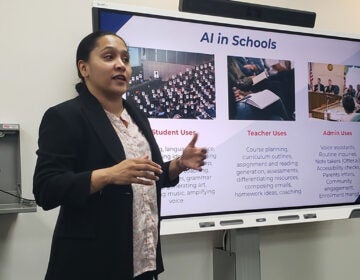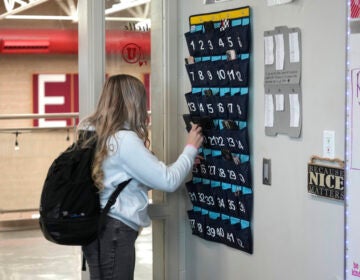From light bulbs to drones, a new curriculum takes flight in North Philly school
A Catholic school in North Philadelphia, is piloting a curriculum that will turn students into literal pilots. Drone pilots, that is.
Listen 2:17-

Cristo Rey students (from left) Catherine Santille, Ramiro Ortega-Zavaleta, Kemar Marshall and Maria Tejada Caceres troubleshoot the programming for their team vehicle. (Emma Lee/WHYY)
-

Student teams assemble and program vehicles as part of their autonomous systems engineering class. (Emma Lee/WHYY)
-

Cristo Rey student Monica Kpedenou demonstrates her program for monitor Jared Boyd during a timed test. (Emma Lee/WHYY)
-

Engineering teacher Eva Porter helps Neriah Garrett with her prograammable vehicle. (Emma Lee/WHYY)
-

Cristo Rey students (from left) Kimberly Rangel, Briana Wells, and Marilyn Mejia check the wiring on their vehicle. (Emma Lee/WHYY)
-

Cristo Rey student Kevin Riddick holds the drone frame he constructed during the first trimester of his autonomous systems engineering class. At the end of the third semester, he and his team will program and test fly the drone. (Emma Lee/WHYY)
A Catholic school in North Philadelphia, is piloting a curriculum that will turn students into literal pilots.
Drone pilots, that is.
Throughout this school year, the students at Cristo Rey have gobbled up technical skills they’ll eventually translate into a fleet of homemade drones. The drones provide a capstone for the school’s new Autonomous Systems Engineering Academy, an initiative funded and developed jointly by the foundation arm of the auditing firm Deloitte and Base 11, an education nonprofit focused on getting more students into STEM-related fields.
Nothing has actually left the ground yet.
On Monday, students road-tested model cars they controlled using coded commands loaded onto a small computer. The three-wheeled shells moved forward and back, turned side to side, snapped pictures, and lit up.
That may sound rudimentary, but it’s several steps removed from where the students began the year.
“They first started with basic electricity,” explained Eva Porter, a longtime biology teacher recently drafted into duty as an engineering expert.
For the first third of the year, the students focused on light bulbs. They learned how to wire them and mount them, mastering the type of skills one might associate with an old-school shop class.
“Some of them did not even know the difference between a double A battery and a C battery,” said Porter.
Then students zoomed into the 21st century by crafting code that could dictate when the light bulbs turn on and off. Next came motors and more complicated computer languages like Python.
Already the students have used a 3-D printer and some of their woodworking skills to build the bases of their nascent drones — with propellers and programming still to come.
“It’s just amazing to see how things work,” said senior Maria Tejada Caceres.
Tejada Caceres is atypical of those — disproportionately white, Asian, and male — who’ve traditionally wound up in STEM fields. Cristo Rey, meanwhile, is the opposite. About two-thirds of the school’s students are female, while 90 percent are either African-American or Hispanic.
Cristo Rey Philadelphia belongs to a national network of similarly named schools, and its model focuses on workforce training. Students work part-time at school-arranged internships to help with their tuition, with much of the rest typically covered by scholarships. But the students said that much of their in-class education is fairly traditional, oriented around a lecturing teacher or other standard classroom activities.
The engineering academy, however, operates on a project-based model. Much of the learning happens in small, self-guided groups, with teacher-preaching kept to a bare minimum.
“I love engineering because it’s the only hands-on class we actually get to do in school,” said senior Daymer Batties. “And we actually get to put our brains together.”
The academy, said Batties, has helped the students “use different parts of our minds,” a concept he hopes will translate into a career in criminal justice.
Tejada Caceres figured she’d go into nursing, but she’s found herself more and more enthralled by engineering and the art of learning how stuff works.
“Just like a TV that you break, and you get to see the things inside, it all makes sense now,” she said. “You see all the wires and the pretty, shiny things, and it all makes sense.”
Now, she’s starting to reconsider her possible career paths.
“I applied to all my colleges undecided so that I can take a little bit of every course,” she said. “This is so cool … Maybe I would like to do it in the future.”
WHYY is your source for fact-based, in-depth journalism and information. As a nonprofit organization, we rely on financial support from readers like you. Please give today.





